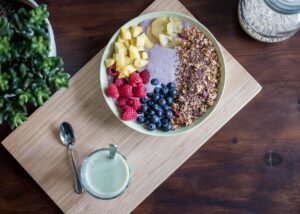While push-ups are a classic bodyweight exercise that requires no special equipment, the importance of nutrition in supporting your performance should not be overlooked. Whether you’re a fitness enthusiast aiming to increase push-up repetitions or someone incorporating push-ups into a comprehensive workout routine, the right nutrition plays a crucial role in providing energy, promoting recovery, and enhancing overall performance. In this article, we delve into the significance of push-up nutrition and offer insights into how you can fuel your body for optimal performance.
The Energy Demands of Push-Ups
Push-ups are a dynamic, compound exercise that engages multiple muscle groups, including the chest, shoulders, triceps, and core. This means that your body requires a sufficient and readily available energy source to perform each repetition effectively. The primary energy sources for quick, high-intensity activities like push-ups are carbohydrates and, to a lesser extent, stored fats.
Carbohydrates:
Carbohydrates are the body’s preferred source of energy for short bursts of intense activity. Consuming complex carbohydrates, such as whole grains, fruits, and vegetables, provides a sustained release of energy that can support you throughout your push-up session.
Hydration:
Proper hydration is equally crucial. Water is essential for maintaining optimal muscle function, aiding digestion, and regulating body temperature. Dehydration can lead to fatigue, decreased performance, and an increased risk of muscle cramps.
Pre-Push-Up Nutrition
Timing:
Ideally, you should consume a balanced meal containing carbohydrates, protein, and a small amount of healthy fats 2-3 hours before your push-up workout. This allows your body to digest and absorb nutrients, providing a steady source of energy.
Example Pre-Push-Up Meal:
- Grilled chicken breast or tofu (protein)
- Quinoa or brown rice (complex carbohydrates)
- Mixed vegetables (fiber and micronutrients)
- A small amount of olive oil or avocado (healthy fats)
Snacking Before Push-Ups:
If you’re short on time, a smaller snack 30-60 minutes before your workout can suffice. Opt for easily digestible carbohydrates and a moderate amount of protein, such as a banana with a tablespoon of nut butter or a yogurt and fruit smoothie.
Hydration Before Push-Ups
Staying adequately hydrated is crucial for performance. Dehydration can lead to early fatigue and decreased exercise capacity. Aim to drink water throughout the day and consider having a glass of water 1-2 hours before your push-up session.
Nutrition During Push-Up Workouts
For shorter workouts like a push-up session, it’s not necessary to consume additional calories during the exercise. However, maintaining hydration is key. Sip water between sets to stay hydrated and support optimal muscle function.
Post-Push-Up Nutrition
Recovery Macronutrients:
After completing your push-up workout, focus on replenishing glycogen stores and providing the nutrients needed for muscle repair and recovery.
Protein:
Consuming protein post-workout is vital for muscle protein synthesis. Include a protein source in your post-push-up meal or snack. This can be a protein shake, lean meats, dairy, or plant-based protein options.
Carbohydrates:
Replenishing glycogen stores is crucial for recovery. Include complex carbohydrates in your post-workout meal to restore energy levels. Whole grains, sweet potatoes, and fruits are excellent choices.
Hydration:
Continue to hydrate post-workout to replace fluids lost during exercise. Water is usually sufficient, but for more intense or prolonged workouts, consider a sports drink to replenish electrolytes.
Example Post-Push-Up Meal:
- Grilled salmon or lentils (protein)
- Quinoa or sweet potatoes (complex carbohydrates)
- Steamed broccoli or a mixed salad (micronutrients)
- Water or a recovery smoothie with added protein
Supplements for Push-Up Nutrition
While whole foods should be your primary source of nutrients, supplements can complement your diet and support your push-up performance.
Protein Supplements:
Protein shakes or bars can be convenient for ensuring you meet your protein requirements, especially if you find it challenging to get enough from whole foods.
Branched-Chain Amino Acids (BCAAs):
BCAAs, particularly leucine, play a crucial role in muscle protein synthesis. Consider BCAA supplements to support recovery, especially if you’re doing intense or high-volume push-up workouts.
Electrolytes:
If you engage in prolonged or intense push-up sessions, especially in warmer conditions, consider electrolyte supplements to prevent dehydration and support muscle function.
Listen to Your Body
Individual nutritional needs vary based on factors such as age, gender, weight, and overall health. It’s essential to listen to your body and make adjustments based on how you feel during and after your push-up workouts. If you have specific dietary considerations or health conditions, consulting with a registered dietitian or nutritionist can provide personalised guidance.
In Conclusion
Optimal push-up performance goes beyond physical training – it hinges on providing your body with the right fuel. By paying attention to your nutrition, you can enhance your energy levels, support muscle recovery, and improve overall push-up performance. Whether you’re aiming to increase push-up repetitions or incorporating push-ups into a broader fitness routine, a well-balanced and timely nutritional approach can make a significant difference. Remember, your body’s ability to perform optimally is a reflection of the care and attention you invest in both your training and nutrition.



